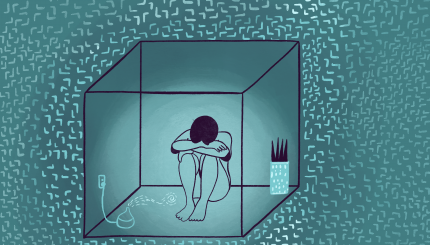No doubt about it: Being a teen is tough. On top of your everyday teen struggles, you may have questions about your own mood or mental health, or how to get help for a friend with mental health issues, like anxiety, depression, or addiction. Fortunately, we’ve rounded up the most common mental health problems for Jewish teens, and we’re here to help you through.
We get it: Life is intense. You’re anxious about Tuesday’s big test, worried that the fight you just had with your significant other may have gotten out of hand, stressed about your friends who are partying on the weekend, and sometimes just feel super-sad for no reason. It’s like you’re on a crazy roller coaster of emotions—and can’t really tell if the highs, twists, and dips are normal or not.
Are they? Well…it’s complicated. As a teen, so many things are happening for the first time, and it can be hard to tell which feelings are just new and confusing—and which could be signs of something more serious. But luckily, there are ways to recognize when emotions go from out-of-the-ordinary to out-of-control—whether it’s in you or a friend—and to get the help you need.

Help us keep Jewish knowledge accessible to millions of people around the world.
Your donation to My Jewish Learning fuels endless journeys of Jewish discovery. With your help, My Jewish Learning can continue to provide nonstop opportunities for learning, connection and growth.
What is mental health?
You take care of your body to keep it healthy, right? But sometimes, you can still come down with a cold for what seems like no reason at all. The same is true of mental health—you take care of your head and your heart by spending time with people you care about, participating in activities you enjoy, and making decisions that are true to you. But even if you treat your body well inside and out, you can still develop a mental illness or go through a hard time.
What is a mental illness?
Mental illness is a condition that affects your thoughts or emotions and interferes with your daily life. One in five teens have, or will have, a serious mental illness in their lifetime. So even though “mental illness” may sound intense, it’s more common than you might think.
Why doesn’t anyone talk about it?
Even though mental illness isn’t uncommon, especially among teens, it isn’t talked about often because of the stigma surrounding it. A stigma is a negative feeling or idea that gets attached to something normal—like the idea that people with mental health issues are “crazy.” In Jewish culture especially, a history of mental illness can be kept under wraps because people are worried about how it will look to the community, or how it will be perceived by future romantic partners. But the cool thing is, the way we talk about mental health is changing. Your generation is becoming more vocal about how common mental illness is. You’re realizing that it’s nothing to be ashamed of, and you’re accepting that it’s better to get the help you need than to suffer in silence.
What are the signs that someone needs help?
If you’ve been feeling anxious, depressed, or even just “off” for a period of longer than two weeks, or if these feelings or thoughts are getting in the way of you living your life, it might be time to reach out and get help. There are many different types and degrees of mental illness, and everyone’s experience will be different. But there are some early warning signs, and we’ve gathered up some of the main red flags below:
Normal: Feeling down or blue every now and then.
- It may be time to reach out if…. You’re feeling sad or hopeless for more than two weeks at a time, or thinking about hurting yourself. Find out more about depression here.
Normal: Feeling shaken up after a stressful event.
- It may be time to reach out if… You’re having recurring nightmares, struggling to focus, or feeling jittery more than a month after experiencing something traumatic. Find more about trauma and PTSD here.
Normal: Getting stressed out before a big exam or performance.
- It may be time to reach out if… You’re getting so nervous or stressed out that you start avoiding certain aspects of your life, like cutting school or skipping the big game. Learn more about anxiety here.
Normal: Getting into a fight with your significant other and taking a break to cool off.
- It may be time to reach out if… You’re afraid of your significant other or how they’ll react to your opinions, who you hang out with, or the choices you make. Find out more about healthy relationships here.
Normal: Going to a party and experimenting with drugs or alcohol.
- It may be time to reach out if… You’re putting drinking or drugs before other priorities like your friends, your family, your schoolwork, or your hobbies. Find out more about addiction here.


